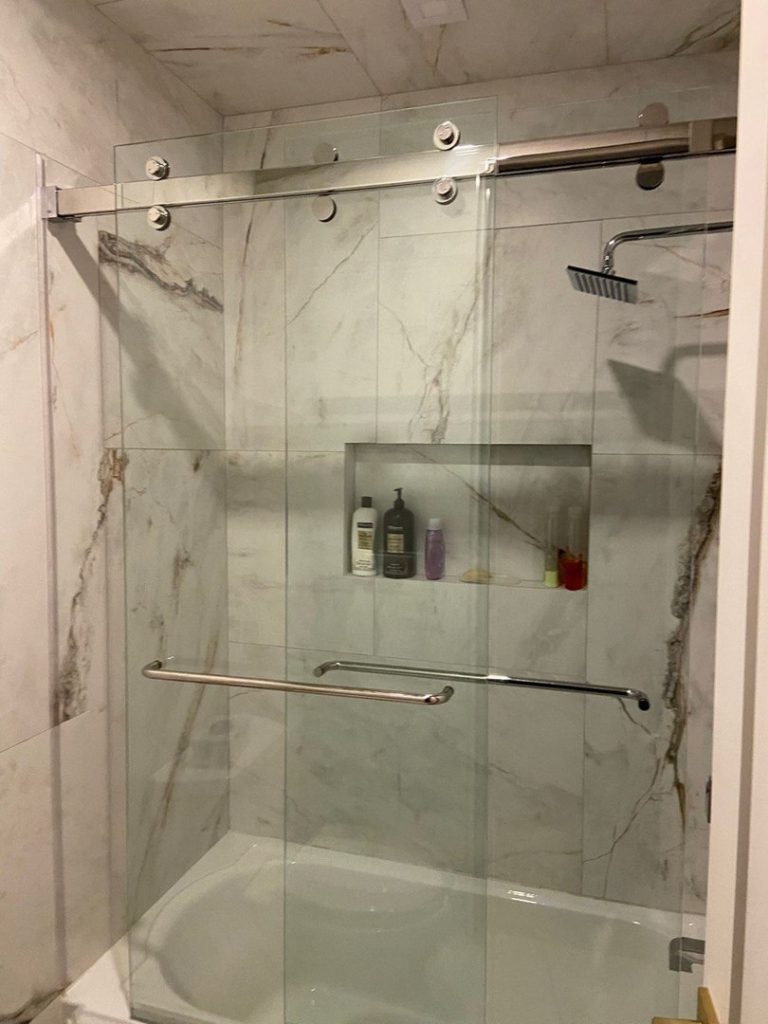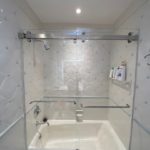Shower doors
These doors are designed to enclose shower areas, providing privacy and preventing water from splashing onto the bathroom floor. They come in various styles, materials, and configurations.
-
Shower doors are an essential component of any modern bathroom, adding both functionality and aesthetic appeal to the space. These doors are designed to enclose shower areas, providing privacy and preventing water from splashing onto the bathroom floor. They come in various styles, materials, and configurations to suit different preferences and bathroom layouts.
Types of Shower Doors:
- Sliding Doors: These doors slide on tracks and are a great space-saving option, ideal for smaller bathrooms. They provide easy access to the shower.
- Pivot Doors: Pivot shower doors swing open on a pivot hinge. They offer a wide entrance and are suitable for larger bathrooms.
- Frameless Doors: Frameless shower doors are made of thick tempered glass without any metal framing. They offer a modern and elegant look and are easy to clean.
- Framed Doors: Framed shower doors have metal framing around the glass. They are sturdy, affordable, and come in various finishes to match bathroom decor.
- Round/Curved Doors: These doors are designed for corner showers with a rounded or curved enclosure. They maximize space and are visually appealing.
- Bi-Fold Doors: Bi-fold shower doors fold inwards, making them suitable for bathrooms with limited space. They provide a wider entrance when opened.
Materials:
- Glass: Most shower doors are made of tempered glass, known for its strength and safety. It’s available in various thicknesses and can be clear, frosted, or textured.
- Metal: The framing or structural elements of the shower door are typically made of materials like aluminum or stainless steel. These provide stability and support to the glass panels.
Features and Considerations:
- Waterproofing: Effective waterproofing features ensure that water stays inside the shower, preventing leaks and water damage to the bathroom floor.
- Easy Maintenance: Choose shower doors that are easy to clean and maintain. Frameless doors and doors with special glass coatings are often easier to keep looking pristine.
- Aesthetics: Consider the design and style of the shower door to ensure it complements the overall bathroom design and decor.
- Accessibility: Ensure that the door design accommodates all members of the household, including those with mobility challenges.
- Installation: Professional installation is recommended to ensure the door is fitted securely and functions properly.
Shower doors are an essential aspect of bathroom design, providing not only practical benefits but also enhancing the overall look and feel of the space. Choose a shower door that suits your preferences, bathroom layout, and maintenance requirements.
-
-
Glass Thickness:
- Shower door glass typically ranges in thickness from 6mm (1/4 inch) to 10mm (3/8 inch) or even 12mm (1/2 inch) for frameless doors.
- Thicker glass provides more sturdiness and durability.
-
Glass Types:
- Tempered Glass: Most shower doors use tempered glass due to its safety properties. Tempering increases its strength and shattering resistance.
- Clear Glass: Standard transparent glass that allows light to pass through, giving a spacious feel to the shower.
- Frosted Glass: Sandblasted or acid-etched to create a frosted, translucent appearance, providing privacy.
- Textured Glass: Various patterns or textures can be added to the glass for both aesthetics and privacy.
-
Frame Materials:
- Aluminum: Commonly used due to its lightweight, durability, and resistance to corrosion.
- Stainless Steel: Provides a sleek, modern look and is highly resistant to rust and corrosion.
-
Hinges and Hardware:
- Hinges: Made of stainless steel or brass, allowing the door to pivot or swing smoothly.
- Handles: Available in various designs and materials for ease of operation and aesthetic appeal.
- Seals and Sweeps: Made of materials like PVC or rubber to prevent water leakage and ensure a watertight seal.
-
Coatings and Treatments:
- Anti-Stain Coatings: Applied to glass to reduce water spots and mineral deposits, making cleaning easier.
- Nano-Coatings: Repel water and soap scum, minimizing maintenance needs.
- Anti-Scale Coatings: Help prevent the buildup of limescale, especially in hard water areas.
-
Door Types:
- Single Door: A single swinging or sliding door for a straightforward entry into the shower.
- Bypass Doors: Two or more sliding panels that glide past each other.
- Quad Doors: Four separate panels that slide to create a large opening for easy access.
-
Installation and Adjustability:
- Adjustable Width: Most shower doors are adjustable to fit different shower openings.
- Leveling Mechanisms: Allow for adjustments to ensure the door is plumb and level during installation.
-
Safety Standards:
ANSI (American National Standards Institute): Shower doors should comply with ANSI safety standards, ensuring their structural integrity and safety.
-
Load-Bearing Capacity:
Engineers design shower doors to withstand a specific amount of force or weight to ensure they remain stable and secure during use.
Considering these technical aspects when selecting a shower door is crucial to ensure the right fit, durability, safety, and functionality for your bathroom.
-



